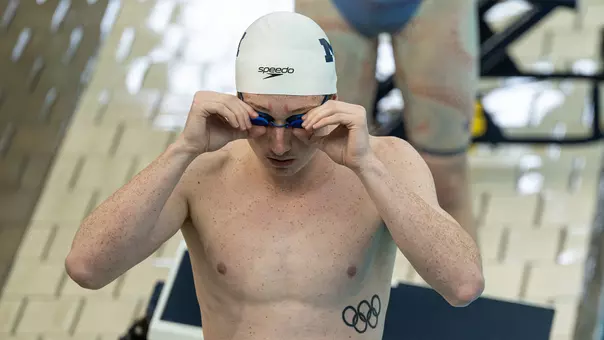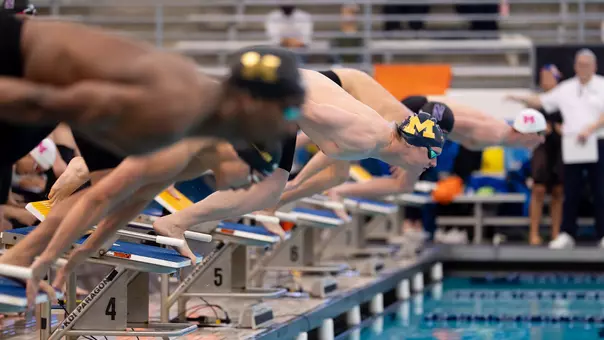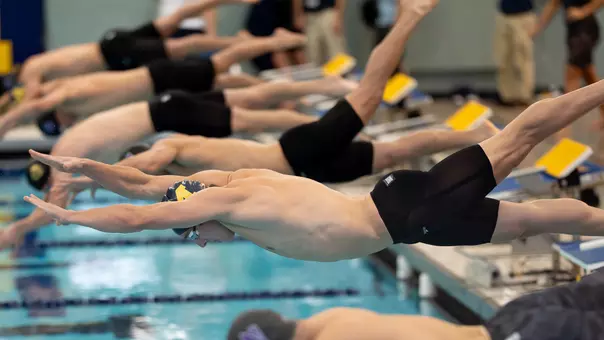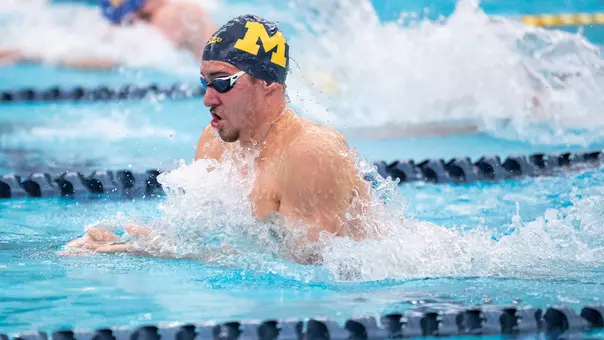
Kornacki: Dolan Connects Current Team to Past Successes
3/23/2016 12:00:00 AM | Men's Swimming & Diving
March 23, 2016

Tom Dolan (middle front) with the 2015-16 Michigan team
By Steve Kornacki
ANN ARBOR, Mich. -- Gustavo Borges was slightly taller than Tom Dolan and Tom Malchow, who were 6-foot-6 and 6-foot-7, and had a thicker build than his two University of Michigan All-America swimming teammates. Borges looked like a basketball power forward, and that was noted to him at a downtown Ann Arbor restaurant on his recruiting visit because former Michigan basketball coach Steve Fisher and the star of his Fab Five also were dining there.
"Chris Webber came up to Gustavo," said Jon Urbanchek, then the Wolverines' swimming coach. "He said, 'Hey, dude, you should be hooping!' And people in airports asked us, 'Are you the Michigan basketball team?'"
Webber had a significant influence on Dolan choosing the Wolverines.
"The story behind why I picked Michigan is that the week before my visit Urbanchek asked me if there was anything I wanted to do when I was here," said Dolan. "I loved the Fab Five, and Chris Webber was my favorite. I said, 'If it's possible, I'd like to meet Chris Webber.'"
Urbanchek set up just such a meeting and surprised Dolan with it.
"We walk into the restaurant and there's Coach Fisher and Chris Webber," said Dolan. "It was awesome. Webber super loved it; Coach Fisher was super nice. Basically, that is essentially what got me. I said, 'I'm here; I'm coming.'"
Dolan and Webber have maintained a friendship through the years, and Webber sent him an autographed photo after the Wolverines won the 1995 NCAA swimming and diving championship and added a letter after Dolan won Olympic gold in the 400-meter individual medley in 1996 in Atlanta.
However, it was a Michigan ice hockey game at Yost Ice Arena that sold Borges.
"He loved the Michigan hockey game and sitting in the student section," said Urbanchek. "They were wild. Later, when Gustavo was asked why he chose a cold-weather school like Michigan, he said, 'I really liked Michigan because I like to wear sweaters, and at the hockey game I had a chance to wear a sweater.'
"Now, what kind of answer was that? But Gustavo loved hockey, and when he got into our Hall of Honor he went in with a hockey player (1997 Hobey Baker Award winner Brendan Morrison) and liked that. Gustavo was a real gold mine for us. He won the 100-yard freestyle four years in a row at the NCAAs."
Borges, now 43, was an eight-time champion as an individual and on two winning relays at NCAA championships. He was a 24-time All-American and a four-time Olympian, winning two silver and two bronze medals in the 100- and 200-meter freestyle and the 4x100 freestyle relay.
Malchow, 39, was the 1998 Big Ten Swimmer of the Year and a seven-time All-American. He captained the 2004 U.S. Olympic team after winning gold in the 2000 Olympics and silver in 1996 in the 200-meter butterfly.
Dolan, 40, was the 1994-95 Big Ten Jesse Owens Athlete of the Year and was named Michigan's Male Athlete of the Year both that year and in 1995-96. He was a 10-time NCAA champion in individual and relay events. Dolan won the gold medal in the 1996 and 2000 Olympics in the 400-meter individual medley and a silver medal in the 200 IM in 2000.
Eric Namesnik won the other Michigan swimming medal in the 1996 Olympics with a silver for coming in right behind Dolan in the 400 IM in the Atlanta Games, and the Wolverines swimming there this week in the same Georgia Tech Aquatic Center revived memories of their past glories.
Namesnik, who died after an auto accident in January 2006 at the age of 35, won the 400 IM in the 1991 Big Ten Championships and another Olympic silver medal in that event in 1992. He was an eight-time NCAA champion.
Urbanchek won 13 Big Ten championships in 22 years as Michigan's coach from 1982-83 to 2003-04. He won a national championship in 1995, when he was named NCAA Coach of the Year as well as Big Ten Coach of the Year for the sixth of nine times.
He's currently coaching postgraduate swimmers, working with the Trojan Swim Club in California and helping U.S. national team swimmers prepare for the 2016 Brazil Olympics with altitude training in Colorado.
"I'm retired but I'm not retired," said Urbanchek, 79. "But I've decided that on my 80th birthday (Aug. 23), I am going to get off the deck. I'm not going to coach kids anymore, but I will continue to do some work mentoring young coaches.
"My health is good, and I want to give something back. I love Michigan."
Urbanchek and his wife, Melanie, have been married 50 years. They have a daughter, Kirsten, and granddaughter, Claire.

Urbanchek (middle front), Dolan (back left), Borges (holding trophy) and Namesnik (left fist raised) join in celebrating Michigan's 1995 NCAA championship.
Urbanchek stays close to the swimming program at Michigan and enjoyed hearing that current Wolverine coach Mike Bottom had Dolan speak to the team March 9.
"I am so glad Bottom brought Tom Dolan back to talk to his kids," said Urbanchek. "Bottom is a good team builder, and I think that's very nice."
Dolan spoke to the team as a group in a meeting room in Canham Natatorium, sharing his wisdom from experience in hopes that it'll help them compete at their optimum levels in the NCAA meet and Olympic qualifying. Much of what he spoke about was directly related to the lessons he learned from Urbanchek.
The swimmers sat in chairs before Dolan, munching on a post-practice banana or granola bar and washing it down with chocolate milk while still in their Speedos.
"Preparation definitely allows you to try to be perfect," Dolan told them, "but perfection is not necessarily the ultimate goal. What you guys will find is that when your days are done here, that the pathway and the rigors you had to endure to get to that end goal is really what's going to make you the man that you want to be in life."
Dolan had to overcome asthma and severe fatigue just to quality for his first Olympics.
"The '96 Olympic Trials hurt," said Dolan. "But that's more important than in the meets where it felt easy. It's supposed to hurt; it's not supposed to be easy. And to adjust in the middle of a race is what separates you from good to great swimmers."
Dolan said he's seen powerhouse teams fail to repeat titles because they got off to a slow start in meets and couldn't adapt to recover.
"The biggest mistake we make at this level is overcomplicating things," he continued. "If you've done everything you possibly can and you've helped your teammates do everything they possibly can, then let it go."
Dolan stressed that for those fortunate enough to swim in the Olympics, there was something about the Michigan experience that won't be topped.
"I had no better time in my career than when I swam at Michigan," he said. "It wasn't because of the success I had but because of the friends I made and the people I swam with. I felt like I helped and assisted others to swim better.
"There's nothing better than college swimming. Our (Olympic team) was tight, but it doesn't compare to this. I can't emphasize to you enough how much you should cherish this. Thanks for allowing me to pass on a little of my competitive craziness."
Dolan has gotten to know Bottom, and so I asked him how Bottom and Urbanchek compare.
"They are different personalities," said Dolan. "There's no doubt about that. Mike is incredible about thinking outside the box. He can step back and realize it may be different equipment or tools used in the water that we never used. He doesn't let guys get bored or stale by doing the same thing over and over. Mike is at the forefront of that mentality. Historically, Jon was at the very cutting edge of bringing science into the sport of swimming training. Jon was known world-wide for training our systems.
"But what is similar is that they know that to get a room full of guys to move in the same direction you have to rely on certain people to stand up and say, 'This is how we need to look at this.' There needs to be a cohesive belief in each other. They both are amazing coaches because they know how to fit the jigsaw pieces of the puzzle together and manipulate some of those personalities at the right times.
"It doesn't always have to be the best or fastest swimmer. It can be a walk-on who has worked his butt off, and so he can stand up at the right moment and say something. That's the beauty of Michigan. The gold medalist isn't the only person who can bring perspective to something going on. I learned so much more from walk-ons, who got zero (scholarship) dollars and just wanted to be part of the team and say, 'I swam for Michigan.' That's their gold medal."
Bottom has a framed photo of Dolan celebrating the 1995 national championship with his teammates on the wall in his office at the pool, and he smiled while watching him meet with his swimmers on the bleacher seats beneath the Big Ten championship banners.
"He connected with me when he spoke about the opportunity he had as freshman against the national championship team the year before (Stanford) and setting the team on fire by going 1-2-3 with two other freshmen (future Olympian John Piersma and Chris Rumley) and watching how it affected the whole team," said Bottom.
"And he's connected. He's connected to these guys as he's been connected to the past teams since he's left. He's connected to those times when we raise a banner as a monument of success for Michigan. He feels that and still feels the emotions he had when he swam at Michigan, and he understands the lessons he learned. His passion for Michigan is pretty amazing."
So, when the Wolverines swim this week in Atlanta, in the pool where he and nine other college teammates swam in the Olympics two decades ago, Tom Dolan and the spirit of his accomplishments will be in the swimming lanes with them.
Read more about the Michigan Olympic swimming heroes of 1996 at MGoBlue.com:
• Tuesday (March 22): Atlanta Holds Olympic Memories for Wolverines
• Thursday (March 24): Kirsten Namesnik, now living in The Netherlands with the two children she had with her late husband, Eric, reflects on life after his tragic death, while coach Jon Urbanchek and teammates discuss his legacy.










